By Lewis West · Tuesday, April 21, 2015 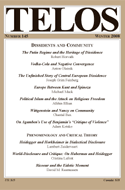 In her exploration of Wittgenstein’s elusive and scattered commentary on community, Chantal Bax notes the absence of an explicit understanding of community in the philosopher’s work. Though Wittgenstein often invokes communal concepts, he rarely provides any details regarding the exact nature of a proper community, or the maintenance and governance a just society requires. Bax highlights the one place where Wittgenstein succumbs to the “unfortunate metaphor” of the body politic: he suggests the Jews, marginalized by European society, resemble a “‘kind of disease, anomaly,'” a “‘swelling'” which can “‘only be considered to be a proper part of the body when the whole feeling for the body is changed'” (105). Bax reads this as a tragic and empathetic lament: Wittgenstein doubts the possibility of a renewed, welcoming society that nonetheless adheres to this same vocabulary of the political body. And it is this prophetic doubt that intensifies the crisis of community that reiterates the necessity of Wittgenstein’s rethinking of life together. In her exploration of Wittgenstein’s elusive and scattered commentary on community, Chantal Bax notes the absence of an explicit understanding of community in the philosopher’s work. Though Wittgenstein often invokes communal concepts, he rarely provides any details regarding the exact nature of a proper community, or the maintenance and governance a just society requires. Bax highlights the one place where Wittgenstein succumbs to the “unfortunate metaphor” of the body politic: he suggests the Jews, marginalized by European society, resemble a “‘kind of disease, anomaly,'” a “‘swelling'” which can “‘only be considered to be a proper part of the body when the whole feeling for the body is changed'” (105). Bax reads this as a tragic and empathetic lament: Wittgenstein doubts the possibility of a renewed, welcoming society that nonetheless adheres to this same vocabulary of the political body. And it is this prophetic doubt that intensifies the crisis of community that reiterates the necessity of Wittgenstein’s rethinking of life together.
Continue reading →
By Monika Lemke · Tuesday, April 7, 2015 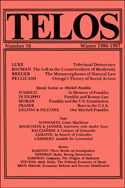 Premised on the Left’s fundamental inability to dissociate itself from the ideals of the bourgeois revolution, Zygmunt Bauman’s “The Left as the Counter-Culture of Modernity” introduces the notion of reconstituting “the Left as the counter-culture of modernism,” rather than as the “counter-culture of capitalism.” Bauman makes the case for this repositioning because, in his view, there is no historical agent to carry out an anti-capitalist program. However, by continuing to defend and maintain the Left’s core values of individual autonomy and political democracy, Bauman believes that the Left can identify the barriers preventing their realization in the present neoliberal paradigm. Bauman recounts the Left’s courtship with various strategies, namely, the heterodox critique of capitalist practice and professed affinity with the industrial working class, and the recent flirtation with postmodern theory. By examining each as it addresses the present historical paradigm, he emphasizes the need to rehabilitate the values of the Leftist program and search for alternative strategies to realize them. Premised on the Left’s fundamental inability to dissociate itself from the ideals of the bourgeois revolution, Zygmunt Bauman’s “The Left as the Counter-Culture of Modernity” introduces the notion of reconstituting “the Left as the counter-culture of modernism,” rather than as the “counter-culture of capitalism.” Bauman makes the case for this repositioning because, in his view, there is no historical agent to carry out an anti-capitalist program. However, by continuing to defend and maintain the Left’s core values of individual autonomy and political democracy, Bauman believes that the Left can identify the barriers preventing their realization in the present neoliberal paradigm. Bauman recounts the Left’s courtship with various strategies, namely, the heterodox critique of capitalist practice and professed affinity with the industrial working class, and the recent flirtation with postmodern theory. By examining each as it addresses the present historical paradigm, he emphasizes the need to rehabilitate the values of the Leftist program and search for alternative strategies to realize them.
Continue reading →
By Lukas Szrot · Tuesday, March 24, 2015 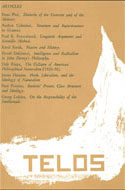 Given the rich and diverse history in the discipline of philosophy, many a practicing philosopher might justifiably remark that insightful philosophical inquiry must withstand the test of time. Though “The Collapse of Philosophical Naturalism” was published in Telos in 1969, many of its insights remain highly relevant to conversations that continue in philosophical and sociopolitical circles today. Dale Riepe issues a damning critique, examining four at once distinct and kindred flaws in philosophical naturalism. Given the rich and diverse history in the discipline of philosophy, many a practicing philosopher might justifiably remark that insightful philosophical inquiry must withstand the test of time. Though “The Collapse of Philosophical Naturalism” was published in Telos in 1969, many of its insights remain highly relevant to conversations that continue in philosophical and sociopolitical circles today. Dale Riepe issues a damning critique, examining four at once distinct and kindred flaws in philosophical naturalism.
Continue reading →
By Lewis West · Friday, March 13, 2015 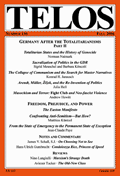 Catastrophic history does not free society: it allows the individual no exit from an endless spiral of destruction. Such destruction promises liberation for some, but it only tilts the world closer to ever-greater annihilation. To place one’s hope in redemptive violence constitutes a leap into the absurd. It is an act of pure faith. This is how Julia Hell, in her essay “Remnants of Totalitarianism: Hannah Arendt, Heiner Müller, Slavoj Žižek, and the Re-Invention of Politics,” reads the apocalyptic politics of Müller and Žižek. Hell frames her critique with a rigorous practicality: she laments Žižek’s “empty terms,” and likewise she sees the political writings of Giorgio Agamben and Judith Butler as hopelessly vague (103). Yet Hell’s rejection of Müller and Žižek does not reflect an entirely pragmatic method. While Hell insists on the need for a usable, specific politics, her attentive readings of each thinker also point to a vast philosophical disagreement. In the end, the true debate is not over the applications of theory. It is instead over the answer to a single question: what is the relationship of politics to death? Catastrophic history does not free society: it allows the individual no exit from an endless spiral of destruction. Such destruction promises liberation for some, but it only tilts the world closer to ever-greater annihilation. To place one’s hope in redemptive violence constitutes a leap into the absurd. It is an act of pure faith. This is how Julia Hell, in her essay “Remnants of Totalitarianism: Hannah Arendt, Heiner Müller, Slavoj Žižek, and the Re-Invention of Politics,” reads the apocalyptic politics of Müller and Žižek. Hell frames her critique with a rigorous practicality: she laments Žižek’s “empty terms,” and likewise she sees the political writings of Giorgio Agamben and Judith Butler as hopelessly vague (103). Yet Hell’s rejection of Müller and Žižek does not reflect an entirely pragmatic method. While Hell insists on the need for a usable, specific politics, her attentive readings of each thinker also point to a vast philosophical disagreement. In the end, the true debate is not over the applications of theory. It is instead over the answer to a single question: what is the relationship of politics to death?
Continue reading →
By Lewis West · Friday, February 27, 2015 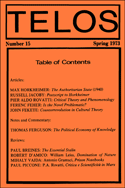 In November 1939, gangs of German civilians and Nazi operatives stormed Jewish stores, synagogues, and homes, killing or arresting those who could not escape. The Nazi leadership had carefully planned the assault—Kristallnacht would become only one among many instances of unimaginable horror. In the coming years, the Nazis proceeded to murder thousands of disabled Germans; when Germany invaded Russia, groups of special units—known as Einsatzgruppen—followed closely behind the German army, liquidating Jews, Communists, and Roma.[1] By 1942, the Nazi death camps had initiated yet another gruesome and terrifying phase of the Reich’s program of anti-Semitism and racial purity.[2] In November 1939, gangs of German civilians and Nazi operatives stormed Jewish stores, synagogues, and homes, killing or arresting those who could not escape. The Nazi leadership had carefully planned the assault—Kristallnacht would become only one among many instances of unimaginable horror. In the coming years, the Nazis proceeded to murder thousands of disabled Germans; when Germany invaded Russia, groups of special units—known as Einsatzgruppen—followed closely behind the German army, liquidating Jews, Communists, and Roma.[1] By 1942, the Nazi death camps had initiated yet another gruesome and terrifying phase of the Reich’s program of anti-Semitism and racial purity.[2]
Continue reading →
By Linas Jokubaitis · Wednesday, February 11, 2015 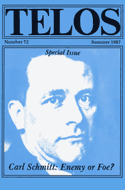 In his essay “Political Aesthetics: Carl Schmitt on Hamlet,” David Pan puts forward an interpretation of the relationship between aesthetics and politics in Schmitt’s discussion of Hamlet. Today the question about the relationship of aesthetics and politics in the thought of German jurist is a widely discussed topic. According to one interpretation, which is best represented by a sentence of Jürgen Habermas, “Carl Schmitt’s polemical discussion of political Romanticism conceals the aestheticizing oscillations of his own political thought.” But according to Schmitt’s self-understanding, this interpretation could not be further from the truth. In his essay “Political Aesthetics: Carl Schmitt on Hamlet,” David Pan puts forward an interpretation of the relationship between aesthetics and politics in Schmitt’s discussion of Hamlet. Today the question about the relationship of aesthetics and politics in the thought of German jurist is a widely discussed topic. According to one interpretation, which is best represented by a sentence of Jürgen Habermas, “Carl Schmitt’s polemical discussion of political Romanticism conceals the aestheticizing oscillations of his own political thought.” But according to Schmitt’s self-understanding, this interpretation could not be further from the truth.
Continue reading →
|
|
 In her exploration of Wittgenstein’s elusive and scattered commentary on community, Chantal Bax notes the absence of an explicit understanding of community in the philosopher’s work. Though Wittgenstein often invokes communal concepts, he rarely provides any details regarding the exact nature of a proper community, or the maintenance and governance a just society requires. Bax highlights the one place where Wittgenstein succumbs to the “unfortunate metaphor” of the body politic: he suggests the Jews, marginalized by European society, resemble a “‘kind of disease, anomaly,'” a “‘swelling'” which can “‘only be considered to be a proper part of the body when the whole feeling for the body is changed'” (105). Bax reads this as a tragic and empathetic lament: Wittgenstein doubts the possibility of a renewed, welcoming society that nonetheless adheres to this same vocabulary of the political body. And it is this prophetic doubt that intensifies the crisis of community that reiterates the necessity of Wittgenstein’s rethinking of life together.
In her exploration of Wittgenstein’s elusive and scattered commentary on community, Chantal Bax notes the absence of an explicit understanding of community in the philosopher’s work. Though Wittgenstein often invokes communal concepts, he rarely provides any details regarding the exact nature of a proper community, or the maintenance and governance a just society requires. Bax highlights the one place where Wittgenstein succumbs to the “unfortunate metaphor” of the body politic: he suggests the Jews, marginalized by European society, resemble a “‘kind of disease, anomaly,'” a “‘swelling'” which can “‘only be considered to be a proper part of the body when the whole feeling for the body is changed'” (105). Bax reads this as a tragic and empathetic lament: Wittgenstein doubts the possibility of a renewed, welcoming society that nonetheless adheres to this same vocabulary of the political body. And it is this prophetic doubt that intensifies the crisis of community that reiterates the necessity of Wittgenstein’s rethinking of life together.  Premised on the Left’s fundamental inability to dissociate itself from the ideals of the bourgeois revolution, Zygmunt Bauman’s “The Left as the Counter-Culture of Modernity” introduces the notion of reconstituting “the Left as the counter-culture of modernism,” rather than as the “counter-culture of capitalism.” Bauman makes the case for this repositioning because, in his view, there is no historical agent to carry out an anti-capitalist program. However, by continuing to defend and maintain the Left’s core values of individual autonomy and political democracy, Bauman believes that the Left can identify the barriers preventing their realization in the present neoliberal paradigm. Bauman recounts the Left’s courtship with various strategies, namely, the heterodox critique of capitalist practice and professed affinity with the industrial working class, and the recent flirtation with postmodern theory. By examining each as it addresses the present historical paradigm, he emphasizes the need to rehabilitate the values of the Leftist program and search for alternative strategies to realize them.
Premised on the Left’s fundamental inability to dissociate itself from the ideals of the bourgeois revolution, Zygmunt Bauman’s “The Left as the Counter-Culture of Modernity” introduces the notion of reconstituting “the Left as the counter-culture of modernism,” rather than as the “counter-culture of capitalism.” Bauman makes the case for this repositioning because, in his view, there is no historical agent to carry out an anti-capitalist program. However, by continuing to defend and maintain the Left’s core values of individual autonomy and political democracy, Bauman believes that the Left can identify the barriers preventing their realization in the present neoliberal paradigm. Bauman recounts the Left’s courtship with various strategies, namely, the heterodox critique of capitalist practice and professed affinity with the industrial working class, and the recent flirtation with postmodern theory. By examining each as it addresses the present historical paradigm, he emphasizes the need to rehabilitate the values of the Leftist program and search for alternative strategies to realize them.  Given the rich and diverse history in the discipline of philosophy, many a practicing philosopher might justifiably remark that insightful philosophical inquiry must withstand the test of time. Though “The Collapse of Philosophical Naturalism” was published in Telos in 1969, many of its insights remain highly relevant to conversations that continue in philosophical and sociopolitical circles today. Dale Riepe issues a damning critique, examining four at once distinct and kindred flaws in philosophical naturalism.
Given the rich and diverse history in the discipline of philosophy, many a practicing philosopher might justifiably remark that insightful philosophical inquiry must withstand the test of time. Though “The Collapse of Philosophical Naturalism” was published in Telos in 1969, many of its insights remain highly relevant to conversations that continue in philosophical and sociopolitical circles today. Dale Riepe issues a damning critique, examining four at once distinct and kindred flaws in philosophical naturalism.  Catastrophic history does not free society: it allows the individual no exit from an endless spiral of destruction. Such destruction promises liberation for some, but it only tilts the world closer to ever-greater annihilation. To place one’s hope in redemptive violence constitutes a leap into the absurd. It is an act of pure faith. This is how Julia Hell, in her essay “Remnants of Totalitarianism: Hannah Arendt, Heiner Müller, Slavoj Žižek, and the Re-Invention of Politics,” reads the apocalyptic politics of Müller and Žižek. Hell frames her critique with a rigorous practicality: she laments Žižek’s “empty terms,” and likewise she sees the political writings of Giorgio Agamben and Judith Butler as hopelessly vague (103). Yet Hell’s rejection of Müller and Žižek does not reflect an entirely pragmatic method. While Hell insists on the need for a usable, specific politics, her attentive readings of each thinker also point to a vast philosophical disagreement. In the end, the true debate is not over the applications of theory. It is instead over the answer to a single question: what is the relationship of politics to death?
Catastrophic history does not free society: it allows the individual no exit from an endless spiral of destruction. Such destruction promises liberation for some, but it only tilts the world closer to ever-greater annihilation. To place one’s hope in redemptive violence constitutes a leap into the absurd. It is an act of pure faith. This is how Julia Hell, in her essay “Remnants of Totalitarianism: Hannah Arendt, Heiner Müller, Slavoj Žižek, and the Re-Invention of Politics,” reads the apocalyptic politics of Müller and Žižek. Hell frames her critique with a rigorous practicality: she laments Žižek’s “empty terms,” and likewise she sees the political writings of Giorgio Agamben and Judith Butler as hopelessly vague (103). Yet Hell’s rejection of Müller and Žižek does not reflect an entirely pragmatic method. While Hell insists on the need for a usable, specific politics, her attentive readings of each thinker also point to a vast philosophical disagreement. In the end, the true debate is not over the applications of theory. It is instead over the answer to a single question: what is the relationship of politics to death?  In November 1939, gangs of German civilians and Nazi operatives stormed Jewish stores, synagogues, and homes, killing or arresting those who could not escape. The Nazi leadership had carefully planned the assault—Kristallnacht would become only one among many instances of unimaginable horror. In the coming years, the Nazis proceeded to murder thousands of disabled Germans; when Germany invaded Russia, groups of special units—known as Einsatzgruppen—followed closely behind the German army, liquidating Jews, Communists, and Roma.[1] By 1942, the Nazi death camps had initiated yet another gruesome and terrifying phase of the Reich’s program of anti-Semitism and racial purity.[2]
In November 1939, gangs of German civilians and Nazi operatives stormed Jewish stores, synagogues, and homes, killing or arresting those who could not escape. The Nazi leadership had carefully planned the assault—Kristallnacht would become only one among many instances of unimaginable horror. In the coming years, the Nazis proceeded to murder thousands of disabled Germans; when Germany invaded Russia, groups of special units—known as Einsatzgruppen—followed closely behind the German army, liquidating Jews, Communists, and Roma.[1] By 1942, the Nazi death camps had initiated yet another gruesome and terrifying phase of the Reich’s program of anti-Semitism and racial purity.[2]  In his essay “Political Aesthetics: Carl Schmitt on Hamlet,” David Pan puts forward an interpretation of the relationship between aesthetics and politics in Schmitt’s discussion of Hamlet. Today the question about the relationship of aesthetics and politics in the thought of German jurist is a widely discussed topic. According to one interpretation, which is best represented by a sentence of Jürgen Habermas, “Carl Schmitt’s polemical discussion of political Romanticism conceals the aestheticizing oscillations of his own political thought.” But according to Schmitt’s self-understanding, this interpretation could not be further from the truth.
In his essay “Political Aesthetics: Carl Schmitt on Hamlet,” David Pan puts forward an interpretation of the relationship between aesthetics and politics in Schmitt’s discussion of Hamlet. Today the question about the relationship of aesthetics and politics in the thought of German jurist is a widely discussed topic. According to one interpretation, which is best represented by a sentence of Jürgen Habermas, “Carl Schmitt’s polemical discussion of political Romanticism conceals the aestheticizing oscillations of his own political thought.” But according to Schmitt’s self-understanding, this interpretation could not be further from the truth. 






